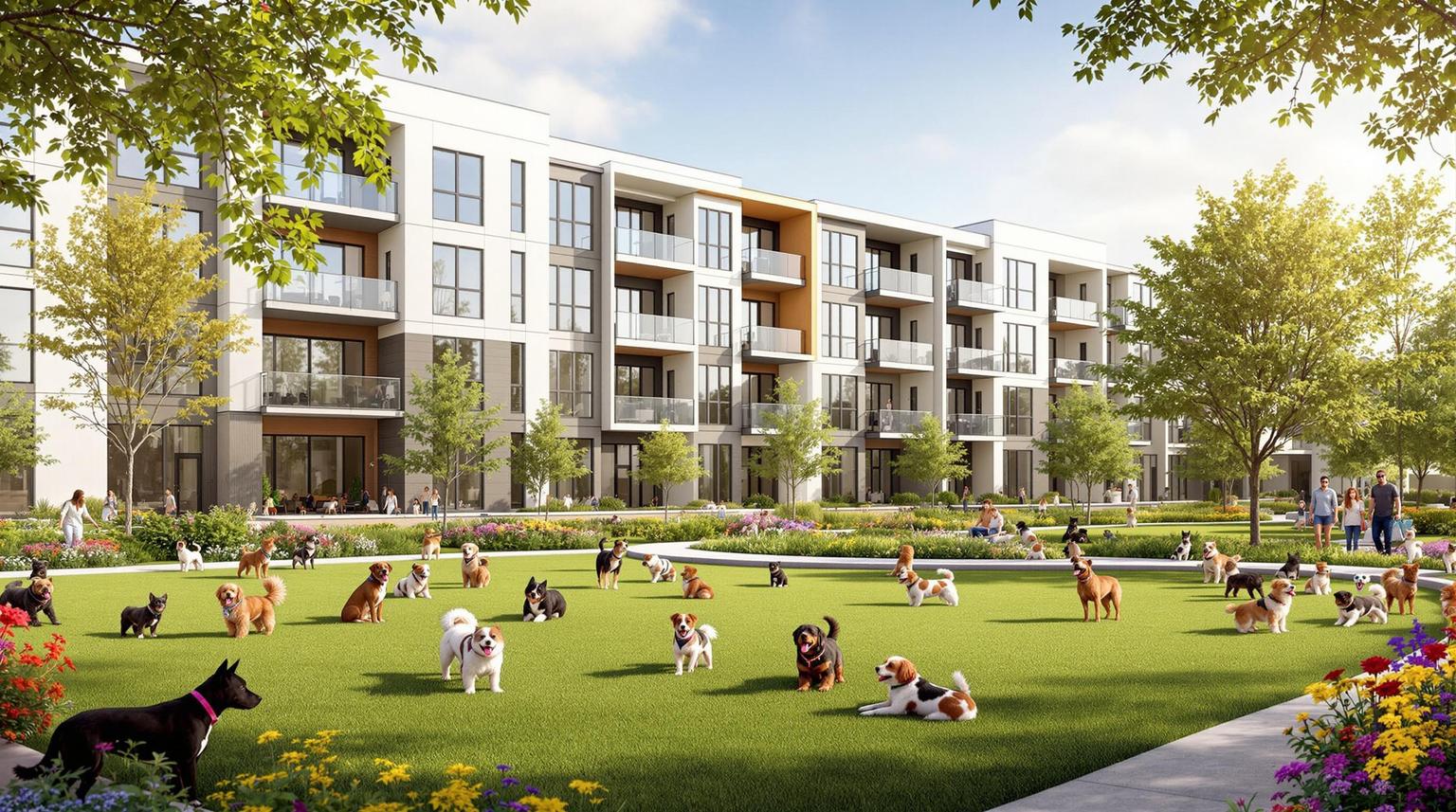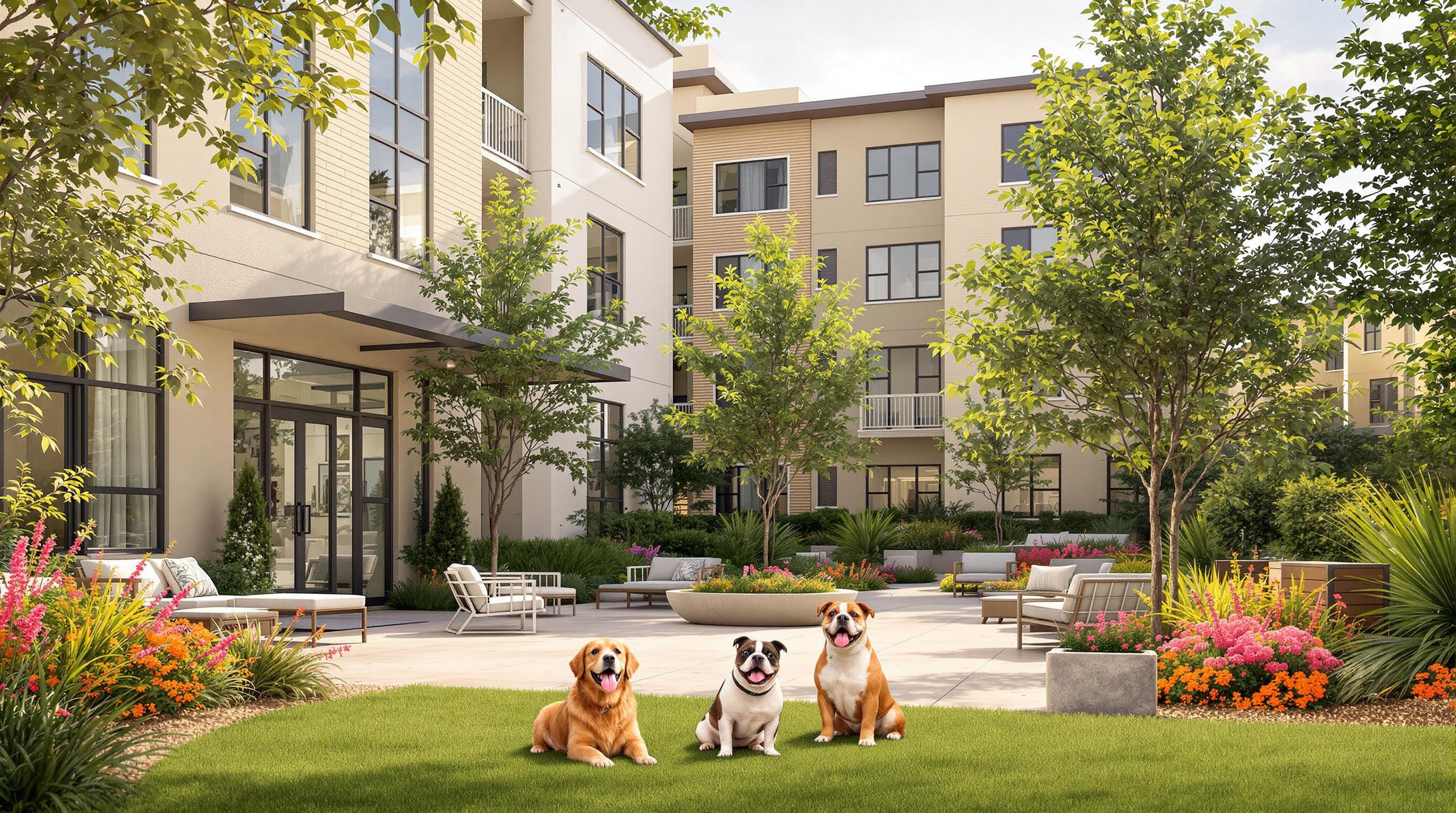Finding an apartment in Austin with a restricted dog breed like Pit Bulls or Huskies can be tough, but it’s not impossible. Here’s what you need to know:
- Breed Restrictions: Many landlords ban specific breeds due to insurance or safety concerns. Commonly restricted breeds include Pit Bulls, Rottweilers, and German Shepherds.
- Solutions:
- Breed-Friendly Properties: Some companies like MAA Properties and Roscoe Properties allow all breeds.
- Specialized Services: Platforms like Austin No Breed Restriction Apartments list pet-friendly options.
- Independent Landlords: They may have more flexible policies.
- ESA Status: Emotional Support Animals are exempt from breed restrictions under the Fair Housing Act.
- Tips: Create a pet profile with vaccination records and references, use local resources like Love-A-Bull.org, and know your tenant rights.
With preparation and the right tools, you can find a home for you and your dog in Austin.
What are Restrictive Breeds?
What Are Breed Restrictions and Why Do They Matter?
If you're renting in Austin and own a dog, understanding breed restrictions can save you a lot of headaches. These rules ban certain dog breeds from rental properties, often due to insurance policies and safety concerns. Most landlords follow insurance guidelines to decide which breeds aren't allowed.
What Are Breed Restrictions?
Breed restrictions are rules landlords enforce to limit specific dog breeds on their properties. These rules are usually tied to insurance policies or concerns about safety. Breeds that often appear on restricted lists include Pit Bulls, Rottweilers, Dobermans, Huskies, German Shepherds, and Akitas.
How Breed Restrictions Impact Renters
For renters with dogs on these restricted lists, finding housing can be a real challenge. It often means fewer options, higher costs, longer searches, and settling for less ideal locations or amenities. While a few property management companies have done away with these rules [3], they’re still rare in Austin, making breed-friendly rentals highly competitive.
That said, there are ways to navigate this issue. Options like working with services that specialize in breed-friendly housing or exploring ESA (Emotional Support Animal) certifications can make the process easier.
Ways to Find Apartments Without Breed Restrictions in Austin
Finding housing in Austin that welcomes all dog breeds can be challenging, but these strategies can make the process easier.
Use Real Estate Services Focused on Pet-Friendly Housing
Real estate services like Austin Apartment Locators and Austin No Breed Restriction Apartments specialize in pet-friendly properties. They maintain large databases of options managed by companies such as RPM, which don’t enforce breed or weight restrictions [1]. These services can quickly connect you with apartments that fit your needs, providing detailed insights into pricing and pet policies.
Check Online Listings for Breed-Friendly Options
Online platforms can be a great resource. For instance, Love-A-Bull.org regularly updates a list of pit-friendly housing options in Austin. Some popular properties include Altura Apartments, Aspire North Austin, and Gables West Avenue, all known for their inclusive pet policies [1][3].
Consider Rentals from Independent Landlords
Independent landlords often have more flexible pet policies compared to larger property management companies. They can evaluate pets on a case-by-case basis rather than adhering to strict corporate rules. To improve your chances, create a thorough pet profile that highlights your dog’s training, behavior, and temperament. Being upfront about your dog’s breed and providing landlord references can also help build trust.
For those seeking 2-bedroom apartments in pet-friendly communities, prices typically start at around $1,760 [1].
If breed restrictions remain an issue, exploring the possibility of obtaining an Emotional Support Animal (ESA) status may offer a legal solution for securing housing.
sbb-itb-70fce3e
How Emotional Support Animal (ESA) Status Can Help
If you're a renter facing breed restrictions, ESA status can open doors to housing that might otherwise be off-limits due to standard pet policies.
Legal Protections and Documentation
Under the Fair Housing Act (FHA), landlords must waive breed restrictions and pet fees for tenants with proper ESA documentation. This applies across all housing types in Austin, whether you're eyeing a downtown apartment or a suburban home [2][4].
To get ESA documentation, you'll need to consult a licensed mental health professional. They’ll assess your situation and provide a letter that includes their signature, license number, contact information, and an explanation of why the ESA is necessary. There's no need for additional registration or certification - just the letter from your mental health professional is enough [2][7].
Talking to Landlords About ESA Status
When you approach your landlord with ESA documentation, it's important to stay calm and well-prepared. While some landlords may initially push back, they cannot legally demand anything beyond your ESA letter. For guidance, the U.S. Department of Housing and Urban Development (HUD) website offers helpful resources to navigate these discussions [2][4].
Keep in mind that while landlords can't charge pet fees or deposits for ESAs, you are still responsible for any damage your animal might cause. Organizations like Austin No Breed Restriction Apartments can provide free advice about ESA documentation and tenant rights [2][7].
ESA status can make a big difference, but there are other ways to make your apartment search smoother. Let’s dive into more tips to help you find the right home.
Helpful Tips for a Smoother Apartment Search
Finding pet-friendly housing in Austin can be tricky, especially if your dog belongs to a commonly restricted breed. Here’s how to make the process easier and more effective.
Create a Profile for Your Dog
A detailed pet resume can make a big difference in getting a landlord’s approval. Include things like vaccination records, training certificates, and references from past landlords or veterinarians [1]. Go beyond the basics - tell a story about your dog’s personality and behavior to make them stand out.
Here’s what to include:
| Component | What to Include | Why It Matters |
|---|---|---|
| Health & Training | Vaccination records, vet documents, training certificates | Shows you’re a responsible pet owner |
| References | Letters from landlords, vets, or trainers | Adds credibility and reassurance |
| Photos | Pictures of your dog being calm and friendly | Highlights your pet’s good nature |
Understand Your Rights as a Tenant
Knowing your rights can help when negotiating with landlords. While Texas allows breed restrictions, there are protections for pet owners in certain situations. For example, landlords cannot deny tenants with valid Emotional Support Animal (ESA) documentation, according to Austin No Breed Restriction Apartments [2][5].
If you have an ESA letter, landlords are only allowed to ask for:
- Verification of the ESA letter’s legitimacy
- Basic health and vaccination details for your pet
- Assurance that your pet won’t pose a safety risk
Ask for Recommendations from Local Pet Owners
Austin’s pet-friendly community is a goldmine of information. Join local Facebook groups or online forums where pet owners share housing tips. Experts like Alexander Concepcion suggest reaching out to vets, pet stores, and dog trainers for leads [3]. You can also explore Austin-specific social media groups for firsthand recommendations on pet-friendly apartments.
Conclusion: Securing Housing for You and Your Dog
Finding a home in Austin that welcomes both you and your dog - regardless of breed - doesn't have to feel impossible. The key lies in being well-prepared, knowing your options, and understanding your tenant rights.
Specialized real estate services can make the search easier by offering tailored options for renters with restricted breeds. Companies like MAA Properties and Roscoe Properties are known for their breed-inclusive policies, making them great starting points for your search [3].
If breed restrictions are a concern, emotional support animal (ESA) status might be a game-changer. Under the Fair Housing Act, landlords cannot enforce breed restrictions on ESAs, offering a critical path forward for many dog owners [2].
Austin is also home to an increasing number of communities that welcome all breeds and offer amenities like walking trails and open spaces. Organizations such as Love-A-Bull keep updated lists of breed-friendly housing options to help you navigate the market [3].
Your preparation and presentation can make a big difference in securing the right home. A well-prepared pet profile and proper documentation show property managers that you're a responsible tenant. Many landlords prioritize a dog's behavior and the owner's responsibility over breed stereotypes.
As Austin's housing market continues to shift toward more inclusive pet policies, these strategies can help you overcome breed restrictions and find a home where you and your dog are welcome.
FAQs
Are pitbulls allowed in apartments in Texas?
In Texas, breed restrictions are legal and often apply to breeds such as pit bulls, Rottweilers, Dobermans, Huskies, and Akitas [6]. However, if you're in Austin, there are ways to work around these restrictions:
- Pet-Friendly Communities: Austin has several communities that welcome all breeds, as mentioned earlier in this guide [1].
- ESA Protections: The Fair Housing Act exempts Emotional Support Animals (ESAs) from breed restrictions, provided you have proper documentation. This legal protection can help you bypass these limitations [2].
- Local Resources: Groups like Love-A-Bull offer updated lists of housing options that accommodate all breeds, making your search easier [3].
Although breed restrictions are common across Texas, many properties in Austin are shifting toward more inclusive pet policies. With these resources and strategies, you can find housing that works for you and your dog.


